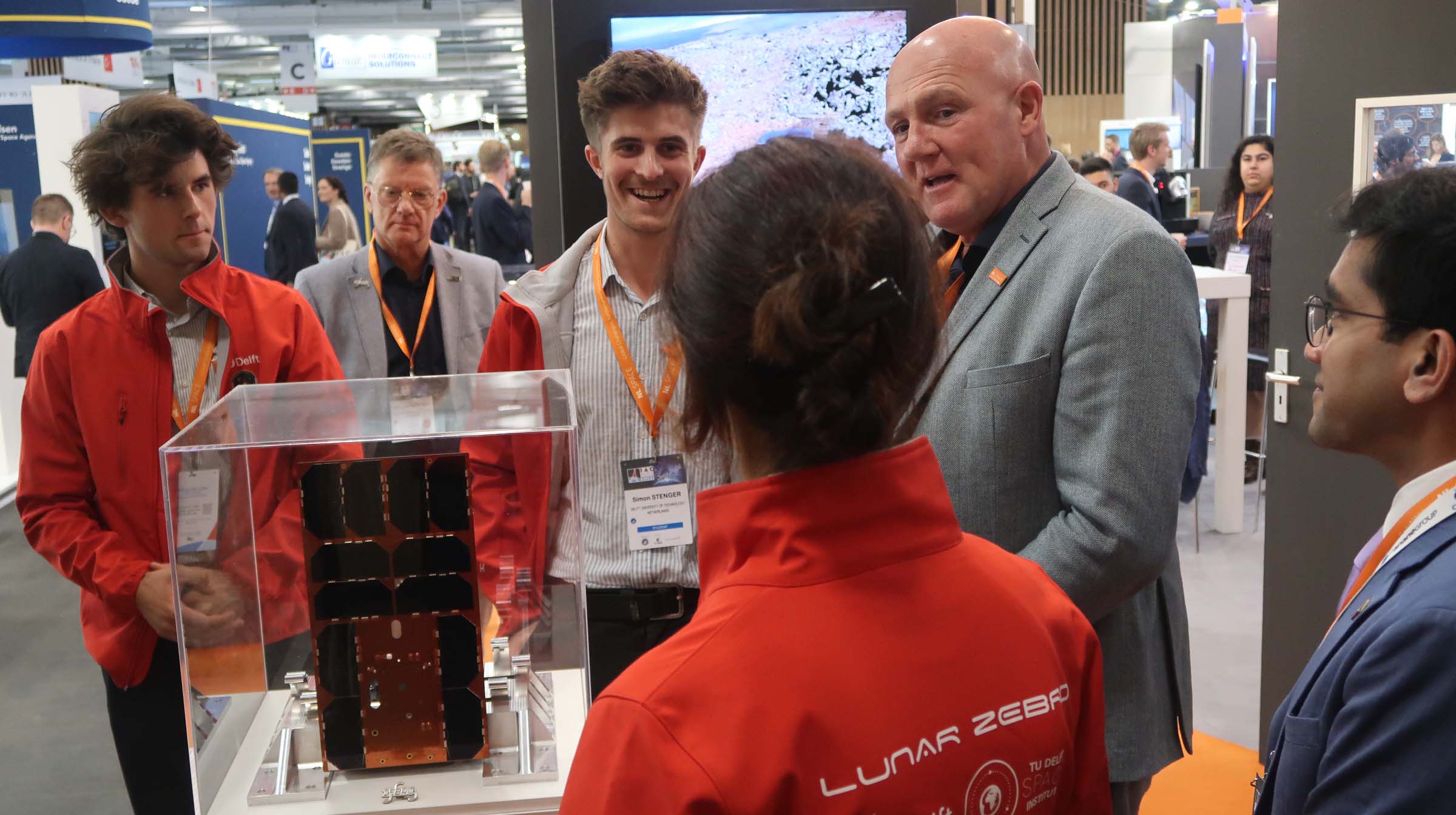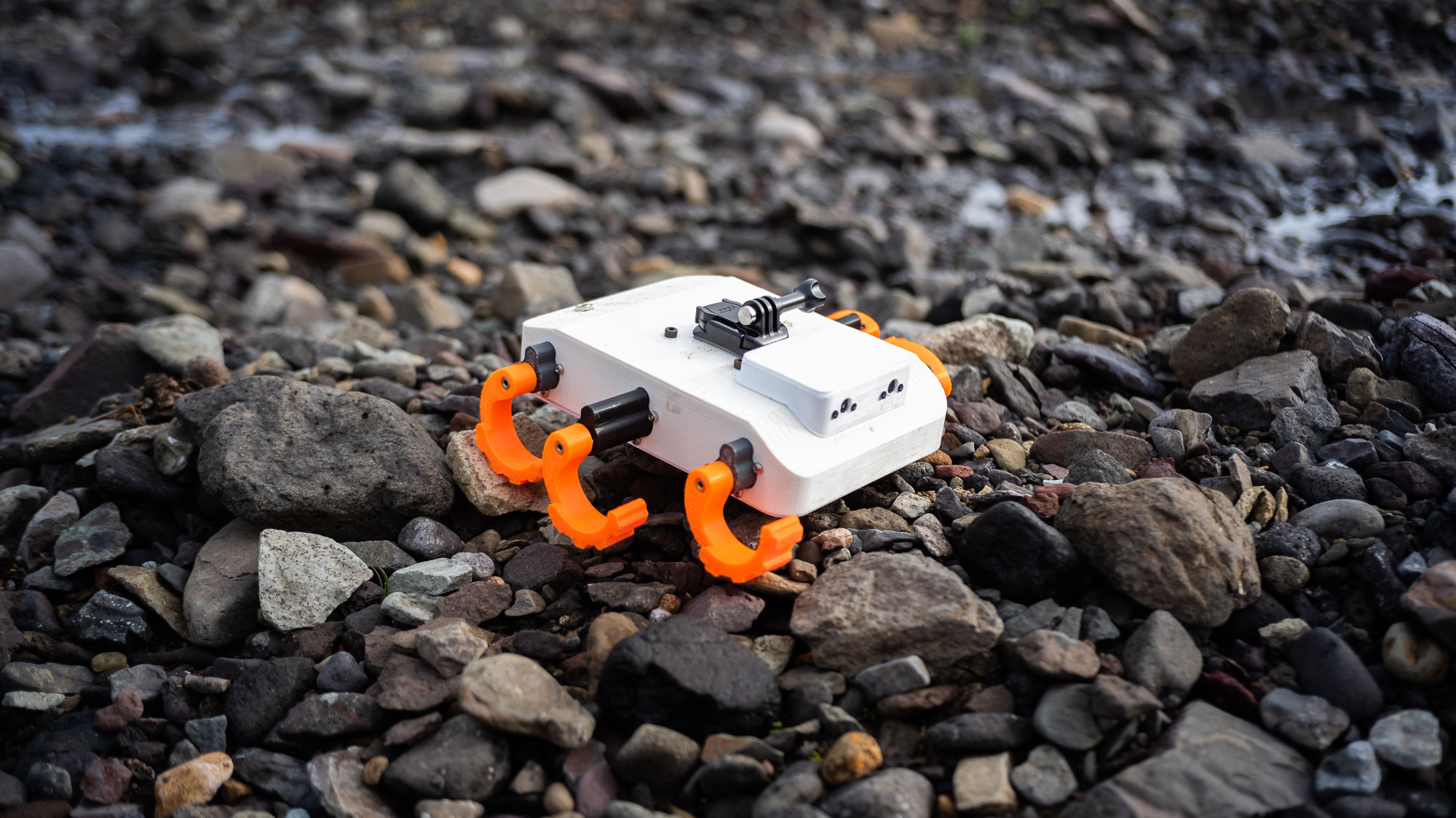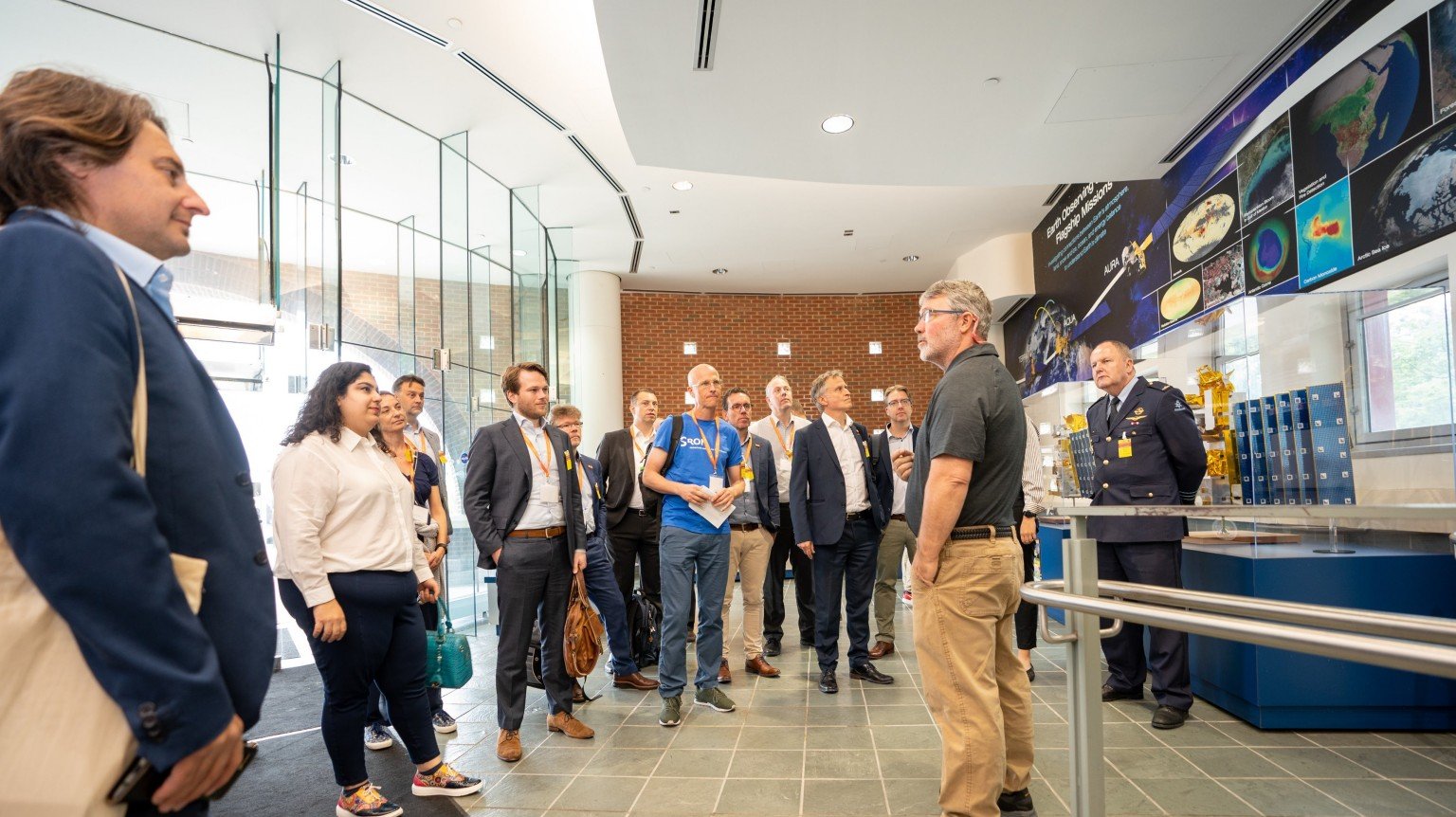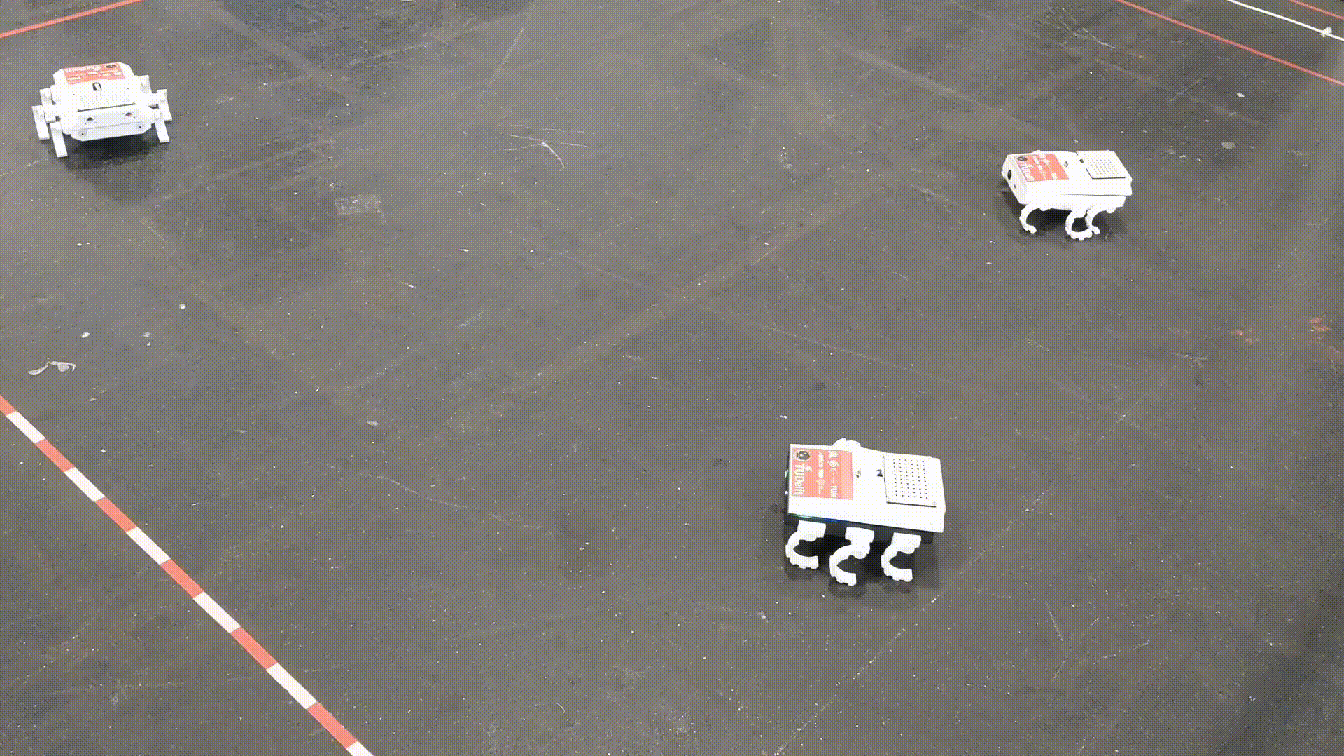Lunar Zebro: students take aim at the Moon
Once you arrive at the world's largest space fair, the International Aeronautical Congress (IAC), first you walk straight by Ariane's rocket and then turn left after ESA's booth. When you have passed three satellites you will see about 10 red jackets under the orange booth of the Netherlands: the TU Delft student team Lunar Zebro. With the guidance of their professors, they will soon go to the Moon with their semi-autonomous rover Laika.
It's starting to get serious now
Lunar Zebro's qualification model stands well-protected in an aluminium and glass display case. ''Nothing should happen to this model,'' Marnix Verkammen, one of the students, explains to the interested visitors. ''In 2023, this model is going to be extensively tested at the Royal Netherlands Aerospace Centre. These are necessary to ensure the rover is robust enough for space travel.'' Temperatures ranging from near absolute zero to oven temperatures, forces of up to and including 20G: the small Rover will be pushed to its limits. Serious negotiations with major space companies to go to the Moon are well advanced, and the fact that Lunar Zebro can now take advantage of this exclusive testing opportunity demonstrates how far they have come.
''It is starting to get serious now.'' Associate Professor Chris Verhoeven is typically content with remaining in the background, like a proud father watching from the sidelines of a sports field. However, if given the opportunity, he gladly shares his enthusiasm for the project. ''Of course, I always had confidence in the ambitions, otherwise I would not have put so much energy into this. It is special to see how far we have come. This year the atmosphere at the fair is different from past years. Everyone can now see that with the qualification model that we are a serious party." A quick survey of the other booths at the fair highlights that confidence, in total there are less than a handful of rovers present at the fair, let alone models ready for a real Moon mission. TU Delft's student rover is one of the exceptions.
Lunar Zebro's team consists of about 60 students, from a variety of faculties. Some students, already working on their Master’s degrees, have been involved since their first year of study. ''Education across all levels is a high priority. Everyone is welcome to join us, and this aspect differentiates us from other student teams within TU Delft. For example, we have students working part-time on challenges of Laika, but also some work full-time on leadership roles. In addition to these, dedicated students pursue Bachelor End Projects (BEP) and MS Thesis projects under the expert guidance, comprising of staff and industry members, to address future science and technology challenges of Lunar Zebro. '' says Professor Verhoeven. All these learning possibilities are being brought together in a new iteration of the rover: the space rover.
Training in Iceland, networking in Washington
Paris was not the team's only international destination last year. Before the IAC in Paris, the United States and Iceland were on the program. "The Dutch embassy in Washington organized a program last spring to connect Dutch companies, universities and research institutes in the space industry with American partners, including NASA. We were one of the invitees!" Cautious pride shines in Prachi Sachdeva's eyes as she talks about the visit.
The highlight of the US trip was undoubtedly a visit to NASA Goddard Space Flight Center. For Prachi, this confirmed the international space community's confidence in the qualities of the Lunar Zebro. "When you explain the design capabilities and science mission of our rover, many people are already impressed. Then, when you tell them that the project is being carried out by a student team, mouths open in amazement." says Prachi. The visit to NASA only reinforced that feeling. "It gives us tremendous confidence to see how positively the space community reacts to our plans and ambitions. At NASA, it was no different."
After Washington, Iceland was next, as it is one of the most rugged landscapes in the world. It was an opportunity to test the movement of the rover in the lava tubes. The Lunar Zebro rover has a distinct way of moving: the six C-shaped legs rotate in turn, so that the rover slowly crawls along. It might look clumsy, but after extensive testing it turned out that this is one of the most efficient movement techniques possible. Perhaps that is not a surprise, the most successful class in the animal kingdom also has six legs: insects. "I have been fascinated by insects all my life, and I still have terrariums next to my work desk," explains Chris Verhoeven, "It was clear to me from the beginning that we should look at what works in nature, and that is six legs. So, the original project name 'Zebro' stands for ‘six-legged robot' in Dutch.
On Iceland's rugged lava fields, full of razor-sharp rocks, the Zebro's six legs were tested again. Steep uphill or downhill, along routes strewn with near-impossible obstacles, the rover proved it could handle all. "It was quite nerve-racking at times," Marnix admits, "but we managed to complete all the tasks.”
Transforming Lunar Exploration
One of Lunar Zebro's greatest qualities is flexibility. "The rover is a platform, which we can adapt and transform endlessly. Our first mission is to measure radiation on the Moon. This research is crucial if humanity wants to establish a serious presence there." In addition to radiation sensors, multiple rovers can also be equipped with radio antennas, which can collectively enable radio astronomy from the Moon. "The rover can be adapted easily, which is how we are trying to differentiate our product," explains Marnix Verkammen.
Regardless of the mission, the rovers must work autonomously. This requires robust software and algorithms, or rather: Artificial Intelligence. The team plans to significantly expand the software department that will write the algorithms behind the swarm. However, the bar is high. Writing the software is already a challenge in itself, but the software for the rovers must be incredibly robust as the error margin is even smaller for a lunar mission. The software must be as simple as possible: any untested piece of code can lead to unforeseen problems. "Think of this logic as the behaviour of an ant. Biologists may see it differently, but they proceed very simply. For example: they run down their route, and only when they run into another ant do they change their route. Such simple conditions are what we are looking for," Marnix explains.
In the end, the rover must function autonomously and be capable of complex cooperation. Here on Earth, it would be easy to run on such software. Even if something goes wrong, a 'patch' can be applied to improve the software without much trouble. Marnix adds, "As you can imagine, in space it is different. We have a connection to the rover, but that connection only has a very low capacity; endlessly sending updates and patches is not an option. When the rovers go to the Moon, we have to be sure that everything is solid."
The software supports the endless applications of the design and operation concepts. For example, rovers can autonomously cooperate, like a swarm of ants. As each ant works towards a common goal, each Lunar Zebro rover on the Moon can work towards a collective scientific mission.
Holding their breaths
Soon, the Lunar Zebro will be doing tests at the Royal NLR. It might get a green light almost immediately, or perhaps possible improvements will rise, the last round of fine-tuning for a project that has spent thousands of hours being built. The test will determine the final steps before a lunar mission. "After that, we can start making concrete arrangements with partners who will get us on the Moon" adds Prachi, "Our rover is fortunately quite small, we hope to be able to secure a payload slot on a lunar lander with relative ease."
Although Lunar Zebro has already been in the works for years, its most important journey is yet to begin. First, it has to fly over 380.000 km to the Moon, going at 39.000 km/h, and land on the surface. The second step is to survive the lunar day, which is 14 Earth days, in the inhospitable landscape of the lunar pole. Only then, the mission can be a success.
Credits picture of Zebro in Iceland: Jamal Ageli (www.jamal-ageli.com)




